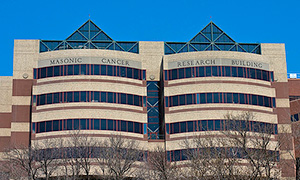April 8, 2014:
The National Cancer Institute has renewed its designation of the Masonic Cancer Center, University of Minnesota, as a comprehensive cancer center after a highly competitive and rigorous process. The reviewers recommended support for the Masonic Cancer Center of nearly $20M over the next 5 years. Final funding levels are still being determined by the NCI.
This is the fourth consecutive designation awarded to the Masonic Cancer Center, which is one of only two NCI-designated comprehensive cancer centers in the state of Minnesota and one of only 41 such centers nationwide.
The NCI noted several high impact areas at the University of Minnesota, including cell-based therapies, tobacco control, cancer prevention and screening, the development of new therapies for cancer treatment, and a growing focus on health disparities. Over 500 University of Minnesota faculty and staff are members of the Masonic Cancer Center.
“One of the strongest aspects of the Masonic Cancer Center is our mission to create a collaborative research environment focused on reducing the burden of cancer for the citizens of Minnesota,” said Douglas Yee, M.D., director of the Masonic Cancer Center. “Our goal has always been to not only vigorously pursue answers, but to share the results of our work with peers and patients with the hope of bettering cancer prevention and care.”
Comprehensive cancer centers are awarded based on several criteria:
- Substantial peer-reviewed research base, supported by significant grant awards;
- Strong evidence of research projects stretching across disciplines to find innovative solutions;
- Profound scientific translation of cancer research to impact patient outcomes incorporating advances in causes, prevention, treatment, and survivorship;
- Robust commitment from both the University and the community at large;
- Inclusion of the local and regional community within the cancer center’s research efforts.
According to the NCI, there are a host of benefits to the comprehensive cancer center designation, including grant funding that can support shared research resources, the ability to impact regional and national strategies in the fight against cancer and a better ability to attract cutting-edge research and treatment programs and highly-qualified clinicians and researchers.
During the most recent site visit by the NCI, the Masonic Cancer Center was particularly lauded for its translational pipeline; a strong focus of researchers at the Masonic Cancer Center is finding prevention and treatment options and bringing them quickly to the clinic and patients.
Background on the Masonic Cancer Center
The Masonic Cancer Center was founded in 1991 as the University of Minnesota Cancer Center under director John Kersey, M.D., a pioneer in pediatric cancer and the use of bone marrow transplant.
It earned the NCI designation as a comprehensive cancer center for the first time in 1998. In 2008, a generous $65 million donation from Minnesota Masonic Charities led to the center’s new name: Masonic Cancer Center, University of Minnesota.
The Masonic Cancer Center is dedicated to translational research that results in more comprehensive care for patients. Recently, a promising University of Minnesota-developed drug, Minnelide, designed to treat pancreatic cancer began clinical trials. Trials are also underway to determine the preventative benefits of green tea on breast cancer.
Centers named as NCI-designated Cancer Centers are eligible for funding through the P30 Cancer Center Support Grant or CCSG.
— Reposted with permission from the Masonic Cancer Center, University of Minnesota.
About the Big Ten Cancer Research Consortium: The Big Ten Cancer Research Consortium creates a unique team-research culture to drive science rapidly from ideas to treatment-changing paradigms. Within this innovative environment, today’s research leaders collaborate with and mentor the research leaders of tomorrow with the unified goal of improving the lives of all patients with cancer.
About the Big Ten Conference: The Big Ten Conference is an association of world-class universities whose member institutions share a common mission of research, graduate, professional and undergraduate teaching and public service. Founded in 1896, the Big Ten has sustained a comprehensive set of shared practices and policies that enforce the priority of academics in student-athletes’ lives and emphasize the values of integrity, fairness and competitiveness. The broad-based athletic programs of the 12 Big Ten institutions provide in excess of $141 million in direct financial aid to more than 8,200 student-athletes playing on more than 300 teams in 43 different sports. The Big Ten sponsors 26 official conference sports, 13 for men and 13 for women, and will add men’s and women’s lacrosse as the 27th and 28th official sports for the 2014-15 academic year. For more information, visit www.bigten.org.















Subscribe to the Big Ten CRC Newsletter X
X Facebook
Facebook YouTube
YouTube